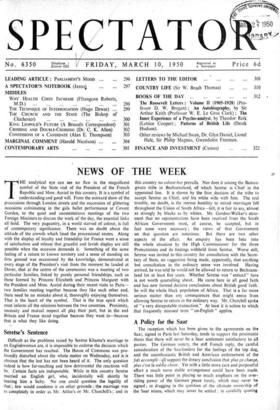NEWS OF THE WEEK
HE analytical eye can see no flaw in the magnificent symbol of the State visit of the President of the French
Republic and Mme. Auriol to this country. It is a symbol of understanding and good will. From the outward show of the processions through London streets and the succession of glittering occasions culminating in the gala ballet performance at Covent Garden, to the quiet and unostentatious meetings of the two Foreign Ministers to discuss the work of the day, the essential links all hold. The very pageantry, in a world starved of colour, is full of contemporary significance. There was no doubt about the attitude of the crowds which lined the processional routes. Along with the display of loyalty and friendship for France went a sense of satisfaction and release that graceful and lavish display are still possible when the occasion demands it. Something of the same feeling of a return to known territory and a sense of standing on firm ground was occasioned by the knowledge, demonstrated at every stage of the President's visit from the moment he landed at Dover, that at the centre of the ceremonies was a meeting of two particular families, linked by purely personal friendships, such as those formed by Princess Elizabeth and Princess Margaret with the President and Mme. Auriol during their recent visits to Paris— two families meeting together because they like each other and, there need be no mistake about it, thoroughly enjoying themselves. That is the heart of the symbol. That is the true spirit which must inform all the relations between the two countries. Proximity, necessity and mutual respect all play their part, but in the end Britain and France stand together because they want to—because that is what they like doing.


































